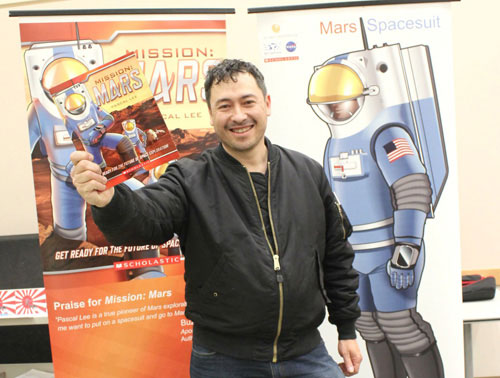
Humans can begin journeying to Mars as early as the 2030s, says Dr. Pascal Lee, a planetary scientist with the Mars Institute, SETI Institute, and NASA Ames Research Center. On May 4, about 85 people, both adults and children, attended Lee’s book talk at Central Park Library. At the Second Annual Emma Kaliterna Author Event, sponsored by the Santa Clara City Library Foundation & Friends, each attending family received a free copy of “Mission: Mars,” Lee’s award-winning children’s book.
“For decades, we have been sending only robots to Mars,” says Lee, who graduated from University of Paris and Cornell University. “Meanwhile, humans have traveled to the moon but never beyond. A human journey to Mars is likely to be the greatest adventure in human space exploration in the 21st century. There is a lot of work being done now around the world, and even on the space station, to get humans ready for the journey to Mars. The first realistic human journey to Mars will be in the 2030s. That seems to be far away, but it’s a bold endeavor, and we have to prepare for it now.”
Wearing a space suit, Lee has explored polar regions of the earth, in the Arctic and Antarctica. He and other scientists have learned that even in such extreme environments that are very cold and dry, life can exist. Lee has studied the history of water on Mars. He and his colleagues wonder if there might be life on the red planet, deep down in its wet underground.
“To explore Mars thoroughly for life, we would need humans there,” Lee continues. “One big challenge would be to design a good spacesuit for Mars. Another big challenge is to learn how to explore Mars safely and productively. We have to do simulations on Earth to prepare for the journey. That’s what I do. I engineer simulations for explorers. We are learning lessons that will be used to train astronauts in the future.”
Extensive preparation for a human Mars journey is essential. Because of the toxic dust and carbon dioxide on the Martian atmosphere, Lee says if an astronaut’s space suit springs a leak, the person will die instantaneously.
“When I was growing up, people were walking on the moon and I thought that was the most amazing thing,” Lee recalls. “I remember as a child, I had children’s books that showed me the inside of rockets and the workings of spacesuits. This experience is what made me want to become a scientist. I also want kids to have a book that can get them excited about science and space exploration.”
When Lee is not traveling to the far corners of the earth for research, he lives in Santa Clara.





